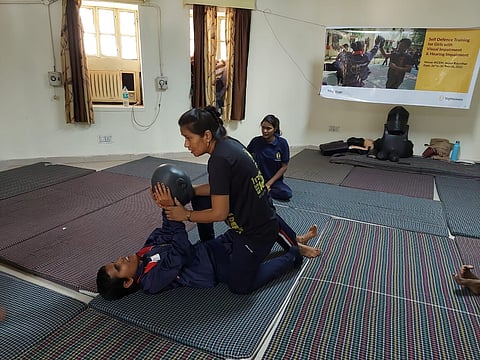

RAJASTHAN: A government school teacher in Rajasthan’s Alwar district is on a special mission — she is empowering young girls by teaching them self-defence, so that they may never live in fear. Asha Suman from the Government Primary School in Kharkhara in Rajgarh block of Rajasthan’s Alwar, has so far imparted self-defence techniques to thousands of girls, including hundreds who are visually impaired, or suffer from speech and hearing disabilities.
Recently on Teachers’ Day, Asha was honoured by the President of India with the prestigious National Award to Teachers-2023 at a special ceremony at Vigyan Bhawan in Delhi. She was one among the 50 selected educators across the country recognised for their outstanding contributions in the areas of education, health and safety.
Asha’s endeavours span across curriculum development, community outreach and women empowerment. She has directly interacted with more than 50,000 women to promote women empowerment and taught self-defence training to 3,000 girls, enhancing women’s safety. But her most notable achievement lies in her dedication in training disabled and deaf-mute girls. Currently, she imparts self-defence and martial arts training to a record 250 deaf and dumb girls. She also trains thousands of school girls, women including housewives, and male and female teachers.
When President Draupadi Murmu awarded Asha with a cash prize of Rs 50,000, a citation and a shawl, Vigyan Bhavan resonated with thunderous applause. But her journey to this accolade was marked by significant challenges. She started her teaching career in the remote and underprivileged Mewat area of Alwar district, where no school building existed. She conducted classes underneath a tree with just 20 students. The village was located three-and-a-half kilometres away from the nearest road.
In this predominantly Muslim community, many families were reluctant to send their daughters to school. With the support of the village sarpanch, Asha organised street plays and inspired families to prioritise education for their daughters. Asha’s efforts yielded significant results and within two years, the enrolment grew from 20 to 120 students. In response to this, the education department constructed a school building in 2007.
However, a tragic incident near the school derailed Asha’s mission. A mentally challenged girl living just 500 metres away from the school was raped, deeply affecting the village. In the aftermath of the distressing event, the number of girls attending the school dwindled. Parents stopped sending their daughters to school since they had to travel three kilometres on the footpath to reach there.
Asha herself had to walk through fields alone and feared for her safety. This incident made Asha think of teaching self-defence to girls to ensure their safety. In a turn of events that she describes as “divinely orchestrated,” the education department offered her a chance to provide self-defence training at the Rajasthan Police Academy around the same time. “I was a Hindi teacher. But after that training, my confidence soared to the point that I believed I could protect myself, no matter how many people came,” said Asha.
Asha never looked back. She initiated self-defence training for groups of 10 girls, teaching them to avoid solitary outings and encouraging travelling in groups, and raising alarm when danger lurked. Her efforts yielded fruit; the girls began to find their voices as they felt safe, and their attendance in school rose.
In 2018, a horrific incident occurred in Thanagaji, Alwar. A married woman was gang-raped in front of her husband, gaining national notoriety. This event shook Asha, leading her to make self-defence training her life’s mission. She thronged schools, colleges and villages, conducting free workshops at the panchayat, district and state levels.
Asha emphasizes that 90 per cent of self-defence training is mental, with only 10 per cent being physical. The training covers body awareness, emergency responses, knowledge of relevant laws, and information about support agencies, helplines and life-saving techniques. It also covers outdoor sessions that teach damage control, and attack and defence strategies.